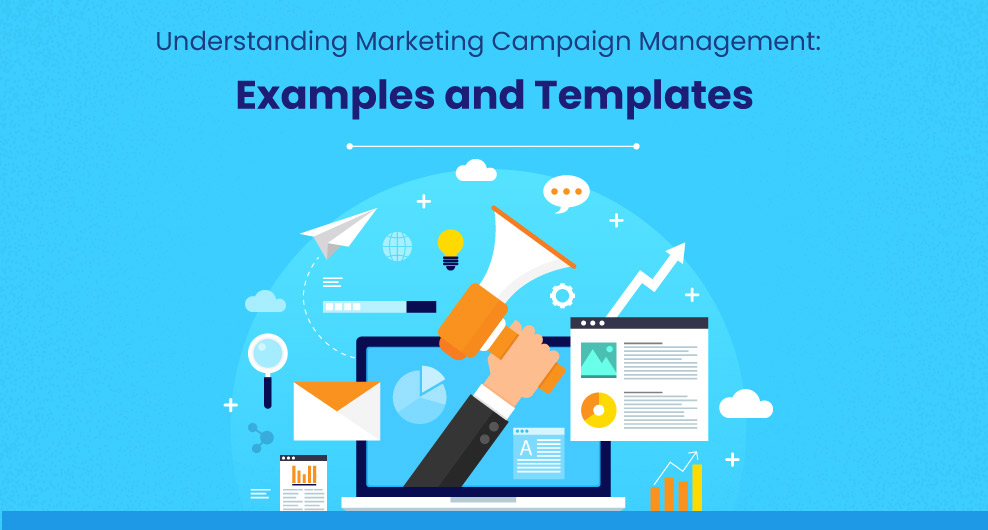Table of Contents
In today’s digital age, effective marketing campaigns are essential for businesses to reach their target audience and achieve their goals. But what exactly is marketing campaign management? In this article, we will delve into the concept, explore real-world examples, and provide you with useful marketing campaign management templates to help you navigate the process successfully.
Whether you’re a marketing professional looking to enhance your campaign management skills or a business owner aiming to streamline your marketing efforts, this guide has got you covered.
So, let’s dive in and unlock the secrets to effective marketing campaign management!
What is marketing campaign management?
Marketing campaign management indicates to the strategic planning, execution, and analysis of marketing initiatives aimed at achieving specific objectives within a defined timeframe. It involves coordinating various marketing activities, such as advertising, promotions, content creation, social media engagement, email marketing, and more, to deliver a cohesive and impactful message to the target audience.
Essential components of marketing campaign management planning
Effective marketing campaign management planning involves several key elements to ensure a successful and impactful campaign.
Here are some essential elements to consider:
- Set Clear Objectives: Clearly define the goals and objectives of your marketing campaign. Are you aiming to increase brand awareness, drive website traffic, generate leads, boost sales, or promote a new product? Setting specific, measurable, achievable, relevant, and time-bound (SMART) objectives will provide a clear direction for your campaign.
- Identify Target Audience: Understand your target audience and create buyer personas to tailor your messaging and tactics accordingly. Conduct market research, analyze customer data, and consider demographics, psychographics, and behavior patterns to identify the right audience segments to target.
- Develop a Compelling Message: Craft a compelling and unique value proposition that resonates with your target audience. Your message should clearly communicate the benefits of your product or service and differentiate you from competitors. Use persuasive language, storytelling techniques, and emotional appeals to captivate your audience.
- Select the Right Channels and Tactics: Determine the most effective marketing channels and tactics to reach your target audience. Consider utilizing a mix of online and offline channels, such as social media, email marketing, content marketing, paid advertising, events, and more. Align your channel selection with the preferences and behaviors of your target audience.
- Create a Detailed Timeline: Develop a comprehensive timeline outlining key milestones, deadlines, and tasks associated with your campaign. This will help you stay organized and ensure that all elements of the campaign are executed in a timely manner. Consider dependencies and allocate sufficient time for each stage, from planning and implementation to analysis and optimization.
- Allocate Resources and Budget: Determine the resources required for your campaign, including budget, personnel, technology, and creative assets. Allocate your budget strategically, considering the costs associated with each marketing channel and tactic. Monitor and track expenses throughout the campaign to stay within budget and adjust as needed.
- Monitor and Measure Performance: Establish key performance indicators (KPIs) to measure the success of your campaign. This may include metrics like reach, engagement, conversions, sales, return on ad spend (ROAS), or customer acquisition cost (CAC). Continuously monitor and analyze campaign performance using analytics tools and adjust your strategies based on the insights gained.
By incorporating these key elements into your marketing campaign management planning, you can enhance the effectiveness, efficiency, and overall success of your campaigns. It enables you to stay focused, organized, and results-driven, maximizing the impact of your marketing efforts.
The benefits of managing marketing campaigns
Managing marketing campaigns effectively brings a range of benefits to businesses.
Here are some key advantages:
- Increased Brand Awareness: Well-executed marketing campaigns help increase brand visibility and awareness among the target audience. By consistently delivering compelling messages across various channels, you can enhance your brand’s recognition and visibility, leading to increased brand recall and customer engagement.
- Targeted Audience Engagement: Effective campaign management allows you to target specific audience segments with tailored messages and offers. This enables you to connect with your ideal customers more effectively, increasing the likelihood of engagement, conversions, and building long-term relationships.
- Improved Customer Acquisition and Retention: By employing strategic campaign management techniques, you can attract new customers and enhance customer loyalty. Engaging campaigns that provide value and address customer needs can drive lead generation, customer acquisition, and encourage repeat business.
- Enhanced Competitive Advantage: Through well-planned marketing campaigns, you can differentiate your brand from competitors. By showcasing your unique selling points, highlighting your brand’s strengths, and effectively communicating your value proposition, you can gain a competitive edge in the market.
- Measurable ROI: Proper campaign management enables you to track and measure the return on investment (ROI) of your marketing efforts. By setting clear goals and using analytics tools, you can assess the effectiveness of your campaigns, identify areas of improvement, and allocate resources more efficiently for optimal results.
- Data-Driven Insights: Effective campaign management involves collecting and analyzing data on customer behavior, engagement rates, conversions, and other metrics. These insights provide valuable information about your target audience, enabling you to refine your strategies, personalize your messaging, and optimize future campaigns.
- Enhanced Marketing Efficiency: Through streamlined campaign management processes, you can improve the efficiency of your marketing operations. Effective planning, resource allocation, and coordination among team members lead to smoother execution, reduced redundancies, and ultimately, cost savings.
Marketing campaign management templates
Marketing campaign management templates can be valuable tools to streamline your planning, execution, and analysis processes.
Here are a few commonly used templates that can assist you in managing your marketing campaigns effectively:
- Campaign Brief Template: This template helps you outline the key details of your campaign, including objectives, target audience, messaging, channels, budget, and timeline. It serves as a central document that aligns stakeholders and provides a clear roadmap for the entire campaign.
- Content Calendar Template: A content calendar template allows you to plan and organize your content creation and distribution schedule. It helps you keep track of important dates, themes, platforms, and responsible team members, ensuring a consistent flow of engaging content throughout your campaign.
- Project Management Template: A project management template helps you track tasks, deadlines, and responsibilities associated with your campaign. It allows you to assign tasks to team members, set due dates, and monitor progress. Project management tools like Yoroproject can be useful for this purpose.
- Social Media Calendar Template: For campaigns involving social media, a social media calendar template is valuable. It enables you to plan and schedule your social media posts, ensuring a consistent and well-coordinated presence across various platforms.
- Analytics and Reporting Template: An analytics and reporting template helps you track and analyze the performance of your campaign. It allows you to record important metrics, such as reach, engagement, conversions, and ROI. This template provides a comprehensive view of your campaign’s effectiveness and helps guide future decision-making.
These templates serve as starting points and can be customized to suit your specific campaign needs. Many online project management and marketing automation tools also offer pre-designed templates that can be easily integrated into your workflow. Utilizing these templates saves time, enhances collaboration, and ensures consistency and organization in your campaign management efforts.
Optimize your marketing campaign management process with YoroCRM
YoroCRM is a versatile marketing campaign management tool that can help optimize your marketing campaign management process. Here’s how YoroCRM can enhance your campaign management:
- Centralized Workspace: YoroCRM provides a centralized platform where you can organize and manage all aspects of your marketing campaigns. You can create dedicated spaces, folders, and tasks for each campaign, keeping all relevant information, files, and discussions in one place.

- Task Management: YoroCRM offers robust task management features, allowing you to create tasks, assign them to team members, set due dates, and track progress. You can break down your campaign into actionable tasks, ensuring everyone knows their responsibilities and deadlines.

- Collaboration and Communication: YoroCRM enables seamless collaboration and communication among team members. You can leave comments, tag teammates, and have discussions within tasks, ensuring everyone stays aligned and informed throughout the campaign.
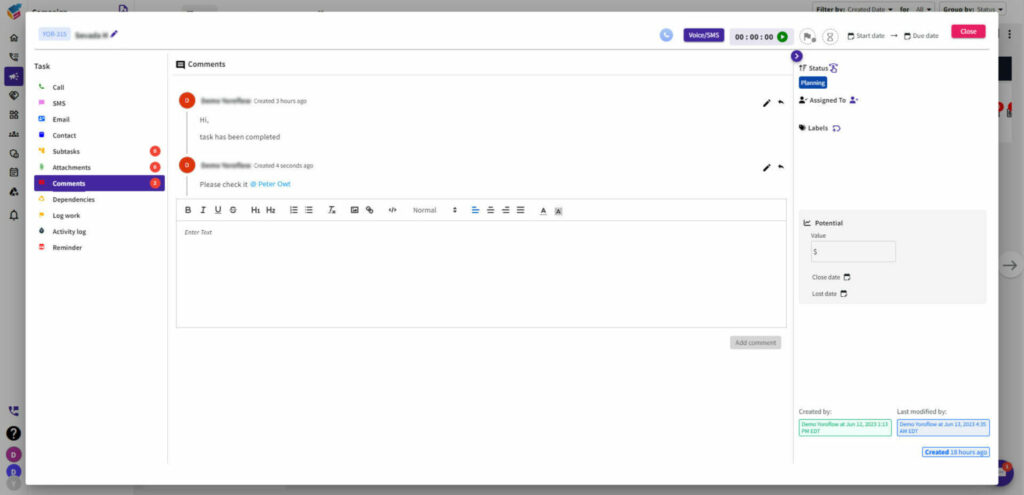
- Customizable Workflows: YoroCRM allows you to create customizable workflows that reflect your specific campaign management process. You can define stages, add custom statuses, and automate task transitions, ensuring a streamlined and efficient workflow for your campaigns.
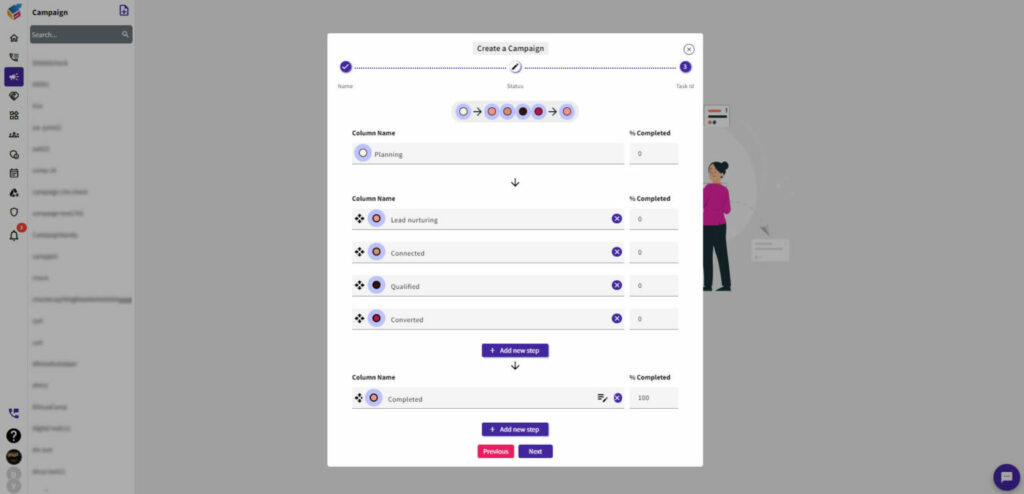
- Calendar View: With YoroCRM‘s calendar view, you can visualize your campaign timeline, tasks, and deadlines in a calendar format. This helps you get a clear overview of your campaign schedule, identify potential conflicts, and ensure timely execution.
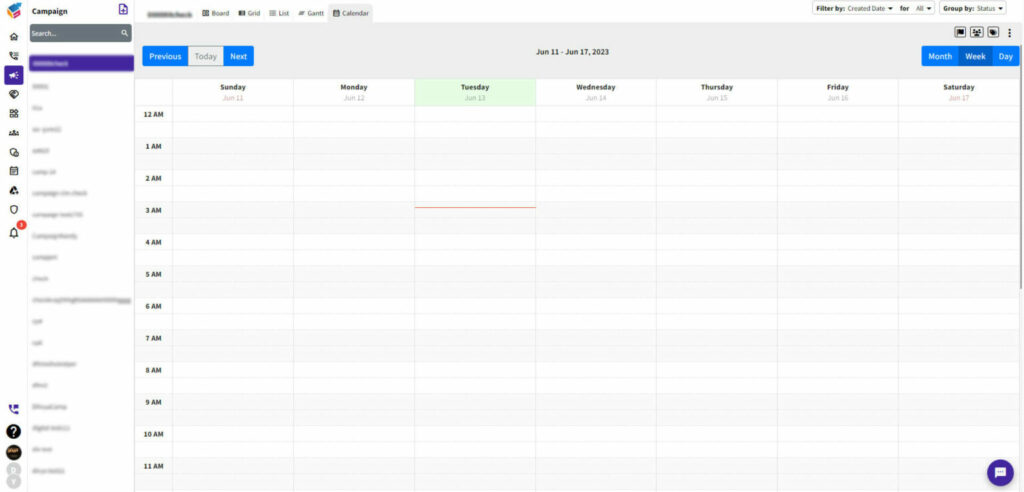
- Reporting and Analytics: YoroCRM offers reporting and analytics features that allow you to track and measure the performance of your campaigns. You can generate reports on task completion, productivity, and other metrics, gaining insights to optimize your future campaigns.
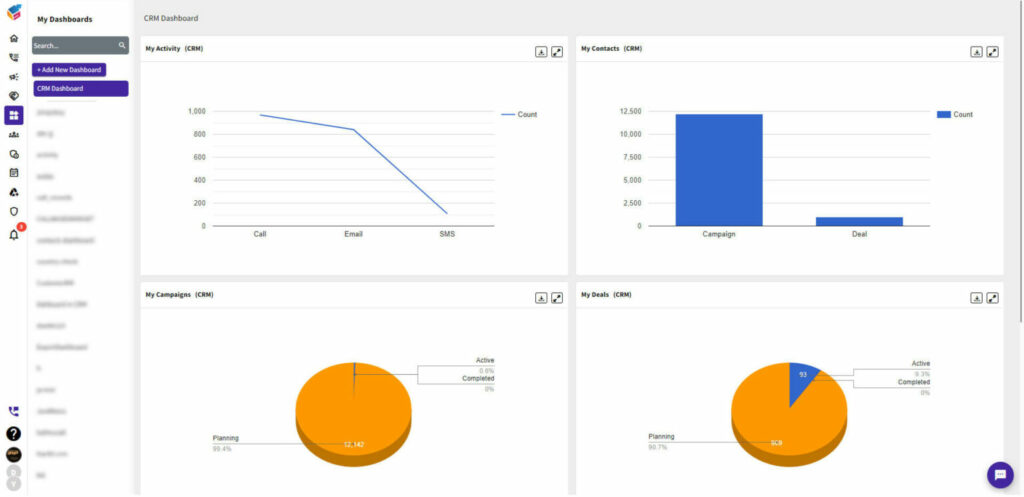
- Integrations: YoroCRM integrates with various marketing and communication tools, such as Twilio, Zoom, LinkedIn, and Slack. These integrations facilitate seamless data transfer, file sharing, and collaboration between different platforms, enhancing your campaign management efficiency.
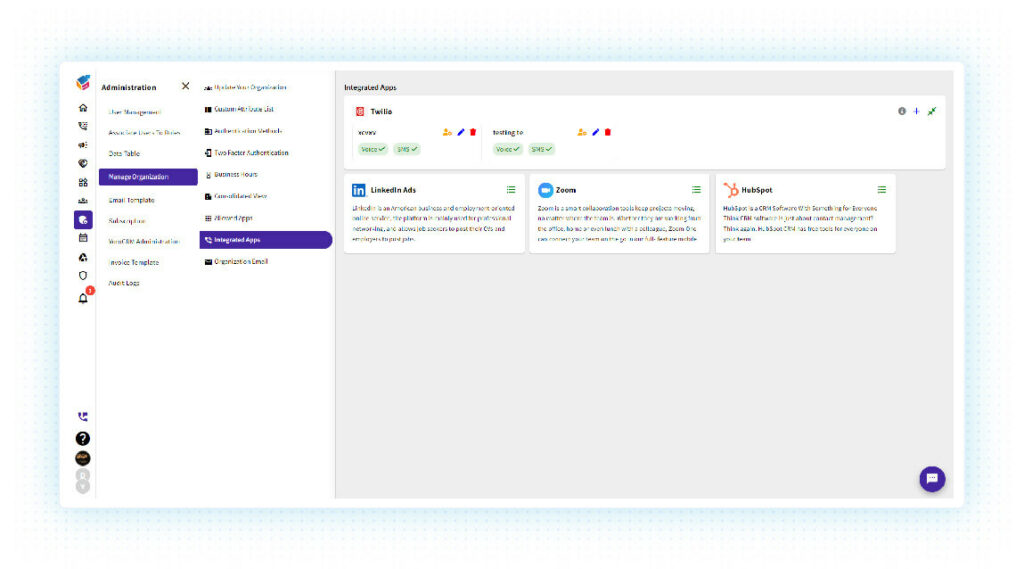
By leveraging YoroCRM‘s features, you can streamline your marketing campaign management process, improve collaboration and communication, ensure timely execution, and gain valuable insights for optimization.
Whether you’re managing a single campaign or multiple campaigns simultaneously, YoroCRM can be a valuable tool to enhance your marketing campaign management efforts.

